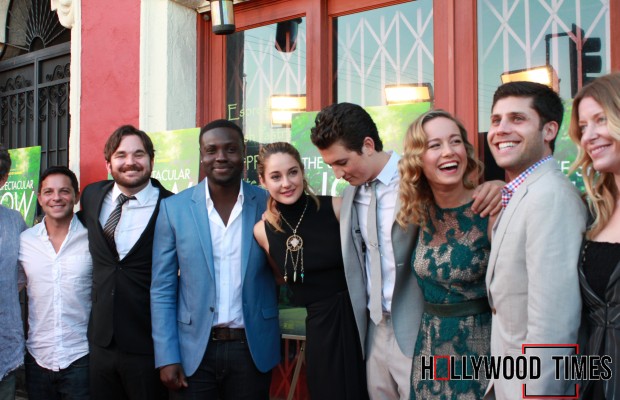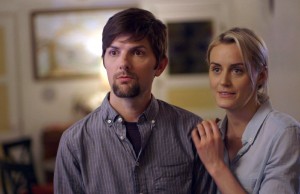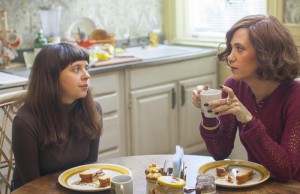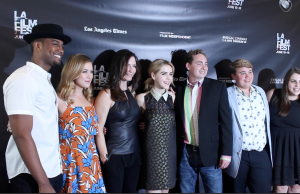Chatting With “The Spectacular Now” Writers And Director 2

Q. Is there any specific scene that you really like from the entire movie?
A. (Pondsolt)Yeah there’s a lot of them. It’s sort of like asking what’s your favorite kid, I think, but you know I really like the walk and talk with Shailene and Miles when they kiss for the first time. It was just sort of a scene that I really imagine a lot. It was something we did as a continuous… as a single take. And it feels like in a single take in a single conversation it captured almost the arc of an adolescent relationship. You know they’re kind of goofy and then it’s sort of awkward and clumsy and nervous and then kind of more sincere and then you know they get a little more serious and then they finally kiss. Miles and Shailene, they do such amazing work there and I just, I really love watching that scene.
Q. First of all I really love the film and it was very touching, emotional, nostalgic all that. And on a little bit of a troubling note I wanted to ask you, cause I don’t know if it’s just me, maybe because I’m a mom, but kids today, especially in the adolescent age group, they’re so vulnerable and films are like the most powerful thing besides video games to be influenced by, especially like the recent tragedy with Cory Monteith from Glee so the whole issue of drinking and alcoholism, but also the sexual… pretty graphic. So both things. I just think that they could in a way be in an influence and I know you weren’t glamorizing either thing so I just wanted to get your comments on that.
A. (Pondsolt) Sure. I think people have a responsibility as storytellers to try to tell stories as honestly as they can and try to dignify the experience of the characters whether they’re six or 18 or 60 years old. You know, teenagers today didn’t invent alcohol, they didn’t invent sex they didn’t invent drugs, they’ve always used all of the above. And I don’t think this is a sentimental film, I think it’s a film… I don’t think it glamorizes or sensationalizes anything. I think there’s sometimes an impulse… we’ve al seen films that seem to do a sort of ripped from the headlines sensationalist approach to young people where it’s assumed that “what kids are really doing is they’re doing meth and they’re raping each other and they’re robbing banks.” You know we’ve all seen films like that and certainly if you read the newspapers there are horrific stories of what kids are doing and I think this is actually, my experience… I mean I can only speak to my experience, we talked about specificity before, I grew up in Athens went to public schools, I had about a half dozen friends that died that either OD’ed from drugs or were murdered before I graduated. Kids were selling crack in the bathrooms—in eighth grade—people were bring guns to school. There were metal detectors at my school. You know there’s that version of reality, which we could have done. I think this is actually a pretty modest approach to it and I think sometimes there’s an idea that to represent anything at all is to glorify it or sensationalize it. I also think we tend to live in a kind of puritanical society where there’s one of two extremes when it comes to say sexuality where it’s either a really violent sexuality where tends to have a tinge of misogyny where women aren’t able to be proactive or enjoy sex and then there’s the version where they’re essentially unics and they don’t have sex. Especially with young people and the truth is teenagers have sex, teenagers drink we can acknowledge that and try to represent it honestly and engage with it or we can hide from it or we can glorify it. So we try to be really honest and respectful you know and it’s part of the DNA of the story. It’s worth saying that as far as the power dynamic of the set in the film, I had total collaborators in the actors and in the writers, which is to say… but with the actors there were many many many dialogues and long conversations, with all of the actors, but specifically Shailene and Miles, about all of the scenes especially ones where they might feel emotionally vulnerable or unsafe, like the sex scene, and the design of it. How it was going to be shot, what would be shown, it was a constant dialogue for well over a month leading up to the shoot so they knew exactly what we would shoot. There was nothing they felt unsafe about, nothing they felt was exploitative and it was something that they both would say if you asked them it’s actually their favorite scene in the film because it was the most honest depiction of sexuality that they’ve seen amongst young people. But it’s a great question and it’s a good conversation to be had and I hope it is a dialogue that people have.
Q. Did you have any cinematic touch-tones that you referred back to as far as inspiration for the film?
A. (Pondsolt) I think I realized that my favorite sort of coming of age or quote unquote teen movies that I liked were the films that I found just to be really emotionally complicated films and romantic films or dramatic films where they just happened to be young people. You know where it’s not the defining feature, which is to say when I see “The Last Picture Show” or “Splendor in the Grass” or “Rebel Without a Cause” or even like “Say Anything” or “The 400 Blows,” I just love those films and the films respect the complexity of what it is to be that age and I think maybe there’s an impulse, especially in America maybe with studio movies of the past 20 years or so, that movies about young people either have to be about adolescence. They have to be adolescent in their values system, they have to be obsessed with t & a or they’re just crude jokes or the kids conversely have to have supernatural powers. I don’t know why, I think maybe it’s a chicken and the egg thing, I think if movies like this… in the way that “Perks of Being a Wallflower” was financially viable, I think if they prove to be financially viable maybe studios will make more films like this. I hope they do because I think people deserve to have their experience represented on screen. But there are also a lot of romantic films that depicted adults that were equally important to me, whether it’s “Manhattan” or “Punch Drunk Love” or “Women under the Influence,” you know I loved those movies and they meant just as much to me for this. I tried to not judge the characters, and not look down on them, not patronize them just because they were teenagers.
Q. Scott and Michael set me straight earlier about Shailene’s character. I was thinking she was naïve, but she’s not really naïve she’s actually simply an outcast, which kind of explains her lack of experience. So can you talk a little bit about… cause we don’t’ usually see that, we either see pretty clear cut characters in teen movies where they are just the nerd… she’s complex, she has a lot of difficulties and layers to her.
A. Yeah and I think Shailene even if you said that the character was an outcast she might even take issue, or add nuance to that, which is to say when I was a kid watching John Hugh’s movies I thought that’s what high school would be like. High school was nothing like that for me. There weren’t clearly delineated groups of jocks, nerds, stoners– it just wasn’t like that. It wasn’t all upper middle class where I went to school. It wasn’t all white, it was diverse, it was economically diverse. I went through a lot of what Sutter went through when I was in middle school and high school. There was a girl that kind of saved my life in a lot of ways because I was profoundly profoundly self-destructive. In that case it’s not that she was an outcast cause there weren’t clearly nerdy or whatever, she was interested in academics. She was interested in reading, she thought about the future; she wasn’t interested in pop culture. Like if you notice a lot of kids the way that they talk is that they use pop culture as short hand. They won’t talk about their emotions but they’ll talk about an episode of “Family Guy” that sort of thing. Shailene would say, I think, that Amy thinks about the future and it’s not that she’s a quote unquote nerd, it’s that she chooses to not engage, go to parties or just go drink all the time. She’s aware, I think she secretly thinks that she’s smarter than everyone else maybe. She knows this is a time in her life and she’s going on to better and brighter things and she has no problem with what people think of her. In some ways she’s more self-confident and in other ways maybe she’s emotionally stunted because she hasn’t had many romantic relationships. The story I think deals a lot with the way the characters don’t value themselves. Sutter I think has profound inadequacy issues cause he feels abandoned, he’s afraid to actually let people get close to him. Amy should know far better, there should be a lot of warning signs in this relationship. This is not a traditional sort of Hollywood ‘meet cute-manic-pixie-dream-girl’ someone gets saved and it’s all better. Actually they do change each other, there are good affects, but there are also some really unhealthy aspects of this relationship. I think there are other versions of this movie that are much more moralistic and finger wagging and movie of the week, where if someone does something bad the characters just get punished and get lectured and everyone feels good. But that almost seems like one of those films that you watch in middle school like “Red Asphalt” or something where it’s like “if you drink you’ll die,” but that feels really simplistic to me. There’s just more shades, hopefully in this.
Q. Did the casting of Mary Elizabeth Winstead in a supporting role kind of come from the fact that you guys had a good working relationship with smashed and you just want to put her in all your films now?
A. Basically yeah, it goes for all the other actors too. I’ve been really fortunate that… pick an actor from this movie, I would like to work with them again. And that goes for actor from the last movie like Aaron Paul or Octavia Spencer…. I’m pretty fortunate that these actors, even just with a major supporting role, they’re all some of my favorite actors. You know Kyle Chandler, Jennifer Jason Leigh, Andre Orroyo, Bob Odenkirk, Brie Larson all these people, I really have loved watching them on television or film and I’ve just been looking for an opportunity to work with them. As a filmgoer or TV goer I find them endlessly compelling, whether they’re doing drama or comedy, so they’re people I want to keep watching. The thing about Mary Winstead is whatever she’s in she makes it better, she makes it good, she grounds it. You pick and studio or action movie she’s done, she just makes things a little more real and adds color and character and depth.
Q. Will that translate to Rodham?
A. We’ll see. Right now with Rodham we’re really just working on the script. It’s something where the script kind of got a lot of attention at the end of this past year because it was on the blacklist and obviously because of the subject matter, people are very interested. And that was essentially the first draft of a script that I didn’t write, you know that Yom Kim wrote. It’s a beautiful script. When I came on as director, I think people thought… or maybe there’s an assumption that that means it’s going to start shooting tomorrow. Well actually films…it took five years to get Spectacular Now made, so it’s just slowly getting that script pitch perfect. It’s also a story and subject matter that you can’t afford to get wrong cause it’s going to be so scrutinized and people will project their own political values on it, you know even if it has nothing to do with it so people could wildly misinterpret it. We’re just trying to make that script airtight.
Q. Could you talk about Shailene and Miles’ audition and once you cast them what did you kind of discuss with them and what surprised you?
A. It’s interesting, one of the reasons I was excited to do this, this was the first film I did that I didn’t write. I co-wrote “Smashed,” I wrote “Off the Black,” which was my first feature, and I really loved this script and when the script came to me I heard Shailene was interested in the part of Amy, which was very exciting to me because I thought she was amazing in “The Descendants.” She gave a fiercely intelligent, mature, complicated nuanced performance that lacked any vanity. You know she reminded me a young Barbara Hershey, or Debra Winger, Sissy Spacek. And I saw her almost as an emotional touchtone for the value of this film, which is to say these aren’t going to be bad teen actors, these aren’t going to be models that just happen to act. No these are going to be fantastic actors that happen to be young. So I met with Shailene we had a long long conversation at first where we both kind of were checking each other out just to see if we were on the same page about who this character was and making sure that we saw the same thing. Shailene is so smart and so kind, but she’s no nonsense. You know what I mean, she doesn’t want to promote or put out into the world an image of what it is to be a young woman today that devalues it or makes it stupid or simply from an objectified male perspective. She wanted to really create a complicated performance, a complicated role. That was really it. We had tons of conversations but she didn’t have to audition for me, I knew she could do it.



